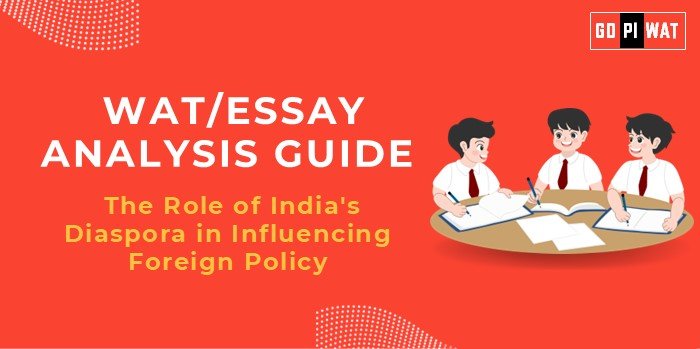📋 WAT/Essay Analysis Guide
🌟 The Role of India’s Diaspora in Influencing Foreign Policy
🌐 Understanding the Importance
India’s diaspora significantly impacts the country’s foreign policy by fostering economic ties, lobbying for favorable international policies, and promoting India’s soft power on global platforms.
⏳ Effective Planning and Writing
✍️ Time Allocation (30 minutes):
- Planning: 5 minutes
- Writing: 20 minutes
- Review: 5 minutes
Word Count Distribution (500 words):
- 📖 Introduction: 60-70 words
- 📝 Body: 350-375 words
- 🔚 Conclusion: 60-70 words
📋 Essay Structure
- 🏁 Introduction: Start with a compelling fact or global comparison.
- “India’s diaspora of 32 million is the world’s largest, contributing $111 billion in remittances annually.”
- 🏅 Achievements:
- Economic contributions: $111 billion in annual remittances (2022).
- Policy influence: Lobbying for H-1B visa reforms and shaping Indo-US relations.
- Cultural diplomacy: Promoting Indian culture through festivals, organizations, and media globally.
- ⚠️ Challenges:
- Integration issues in host countries, including racism and xenophobia.
- Brain drain, leading to a loss of skilled professionals.
- Fragmented engagement strategies by the Indian government.
- 🔮 Future Outlook:
- Developing a cohesive diaspora engagement strategy akin to China’s.
- Encouraging return migration of skilled professionals through incentives.
- Enhancing digital platforms to connect the diaspora with Indian policy initiatives.
📄 Sample Short Essays
- Balanced Perspective: “The Indian diaspora’s achievements in economic contributions and diplomacy are commendable but require cohesive government policies to address integration and maximize potential.”
- Solution-Oriented Approach: “Strategic engagement of India’s diaspora, akin to China’s approach, can amplify India’s global influence while addressing domestic challenges like brain drain.”
- Global Comparison: “While India’s diaspora excels in cultural and economic contributions, adopting frameworks like Israel’s can enhance its geopolitical impact.”


